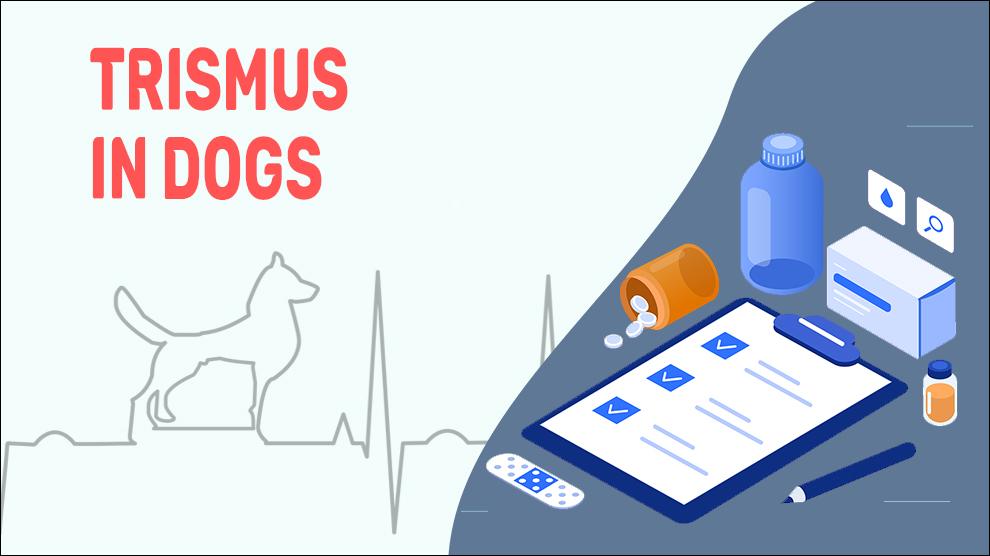What Is Trismus In Dogs?
Trismus refers to the clenching of jaw muscles with a restricted range of motion. Called "lockjaw," trismus is usually caused by a continued, tetanic spasm of the masticatory muscles. Earlier it is used to describe a symptom of tetanus, at present it is referred to as the limited opening of the jaw as a result of any etiology. While unilateral (one side) restriction may happen, by classification, trismus is usually a bilateral (two sides) progression that stems from enhanced tone intervened by the efferent portion of the trigeminal nerve’s reflex arch.
The dog’s masticatory muscles are the muscles concerned with grinding and chewing to enhance the eating process. Masticatory muscle myositis (MMM) affects jaw muscles causing swelling and pain. Trismus is the main symptom of Dogs affected with MMM without agonizing pain. The dog’s muscles of mastication (Medial/lateral Pterygoid, temporalis, digastricus, and masseter) are targeted by the dog’s own immune system. Earlier MMM was once considered to be a type of polymyositis, recent research has established that the condition represents a very distinctive inflammatory myopathy.
The potentially life-threatening disease Tetanus in dogs is relatively uncommon. The overreaction of dogs' muscles to an external stimulus such as toxins (tetanospasmin secreted by an anaerobic bacterium known as Clostridium tetani) makes them rigid with muscle spasms and damage to the respiratory muscles.
In dogs, localized tetanus is more prevalent than generalized (whole body form) tetanus. Localized tetanus is easier to detect and treat than the whole body form; without treatment, the localized type can spread and advance to the generalized type.
Symptoms Of Trismus In Dogs
- Unusual facial expression
- Facial paralysis
- Painful swelling of the temporalis and masseter muscles
- Masticatory muscle atrophy
- Difficulty moving the jaw
- Fever
- Difficulty breathing
- Difficulty drinking or eating or picking up food
- Salivation
- Jawbone shift
- Regurgitation of food and water
Treatment Options For Trismus In Dogs
- Treatment is aimed at the underlying disease
- Tetanus Antitoxin (tetanus immune globulin)
- Antibiotics such as chloramphenicol, gentamicin, amoxicillin, ciprofloxacin, tobramycin, oxytetracycline, etc.
- Anticonvulsants: Phenobarbital and bromide, Levetiracetam, benzodiazepine (midazolam), clorazepate, gabapentin, felbamate and zonisamide
- Muscle relaxants: Methocarbamol, Guaifenesin, Rimadyl, dantrolene
- For treatment of Masticatory muscle myositis: Immunosuppression: Corticosteroid administration and surgery (last option)
Home Remedies For Trismus In Dogs
- Encourage the dogs to utilize chew toys and other exercise activities to provide more workouts to jaws
- Wholesome, nutritious, home-cooked diet as a substitute to commercial diets
- Regularly use medicated wipes with anti-microbial nature / pet-friendly cleansers and keep the dog clean from wounds
- For itchy and scratchy dogs, use creams/gels
How To Prevent Trismus In Dogs?
- There are no separate prevention methods and early diagnosis is the only way of prevention.
- The best way of trismus prevention is to address cuts, wounds or scratches in the dogs immediately so tetanus infection can be kept at bay.
- when you see any cuts or wounds, use medicated wipes that includes a skin disinfectant to clean skin of the dogs
- Masticatory muscle myositis can be treated successfully when diagnosed early but ensure to pursue the treatment protocol that your vet prescribes for your dog.
Affected Dog Breeds Of Trismus
Adult Dogs. There is no breed predisposition.
Causes And Prognosis For Trismus In Dogs
1. Causes:
- Temporomandibular joint ankylosis - Condyle is fused to the fossa by bony or fibrotic tissues. causing total inability to open the mouth
- Temporomandibular joint luxation and dysplasia - Abnormal displacement in the joint due to the extreme opening of the mouth
- Trigeminal nerve paralysis – This trigeminal neuropathy causes the inability to close the mouth that can cause difficulty in eating and drinking
- Masticatory muscle myositis – Dog’s muscles of mastication are targeted by the dog’s own immune system
- A systemic disorder like hypoadrenocorticism
- Osteoarthritis
- Neoplasia
- Tetanus
- Retrobulbar abscess - This is a canine ocular disease
- Horner’s syndrome - Disruption of the sympathetic nerve supply to the eye
- Severe ear disease
- Central neurological lesions
- Trauma to the mandibular bones
2. Mortality:
Trismus doesn’t directly cause any mortality in dogs. However, underlying conditions such as tetanus, and MMM may take up some time for complete recovery. When it is left untreated, it is really fatal for dogs.
3. Diagnosis:
- Complete blood count, chemistry panel
- Radiography (to rule out Disorders of the temporomandibular joints)
- Serum biochemistry profile(creatine kinase (CK), AST, and globulins)
- Muscle biopsy (severity of pathological changes)
- Electromyography - Myositis of the muscles
4. Prognosis:
With early detection, Trismus carries a favorable prognosis, while it is a hard condition to manage. Relapse may occur sooner or later after recovery so treatment must not be prematurely discontinued.
When To See A Vet For Trismus In Dogs?
Contact your vet right away, if you notice any of the following:
- Unusual facial expression
- Facial paralysis
- Painful swelling of the temporalis and masseter muscles
- Masticatory muscle atrophy
- Difficulty moving the jaw
Food Suggestions For Trismus In Dogs
- Vitamin-rich fruits and veggies: Broccoli, spinach, cauliflower, Brussels sprouts, cabbage, snap peas, carrots, tomatoes, green beans, etc
- Antioxidants: Blueberries, strawberries, cherries, cantaloupe, peeled apples, etc
- Fiber-filled veggies: Carrots, beets, Sweet potato, pumpkin, Turnip greens, etc
- Fats: Tuna, sardines, salmon, mackerel, herring, and lake trout
- Complex Carbs: Chickpeas, Brown Rice, legumes, Oatmeal, Sweet Potatoes, Whole Grains, etc
Conclusion
Early diagnosis and proper treatment offers most favorable prognosis. Chronic phase of the Trismus carry poor prognosis and recovery will be good if there is no long- term jaw dysfunction.

















